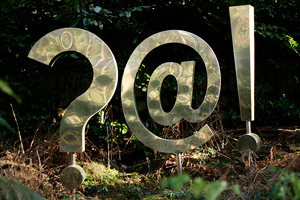
Source: ?@!, Garrettc, Flickr
Read the following paragraph from “What Good is Punctuation?” by Wallace Chafe and then respond by clicking on the appropriate choice for each question below.
(1) There are few people whose’ hearts will skip a beat at the thought of punctuation. (2) For sheer excitement, punctuation ranks well below spelling, which at least lends itself to interesting games and contests. (3) At best it seems to be a necessary evil. (4) Since it is present in all normal English writing, anyone who is going to write English needs to use it in an acceptable way; but it is seldom mentioned as an important ingredient of good writing. Interestingly, in the early 19th century those in the printing profession believed they knew more about how to punctuate than their authors did. (5) As each printer was apprenticed, he read a book called The Printers Manual published in London in 1838 “laments the ignorance of most writers in the art of punctuation and fantasizes about a world in which authors turn in manuscripts with no punctuation at all, leaving that chore to the professional competence of the compositors.”
(6) Even if we might now be willing to admit that punctuation is not exactly in a class with setting type and that authors’ are best allowed to have some control over it, it continues to suffer from a popular reputation as something that is arbitrary, unmotivated, and governed by rules that make no particular sense. (7) In short, it is in a class with “grammar”. (8) Perhaps it is even a part of grammar, but certainly not one of the more interesting parts.
